blog
Book Review: Embrace by Rohina Hoffman
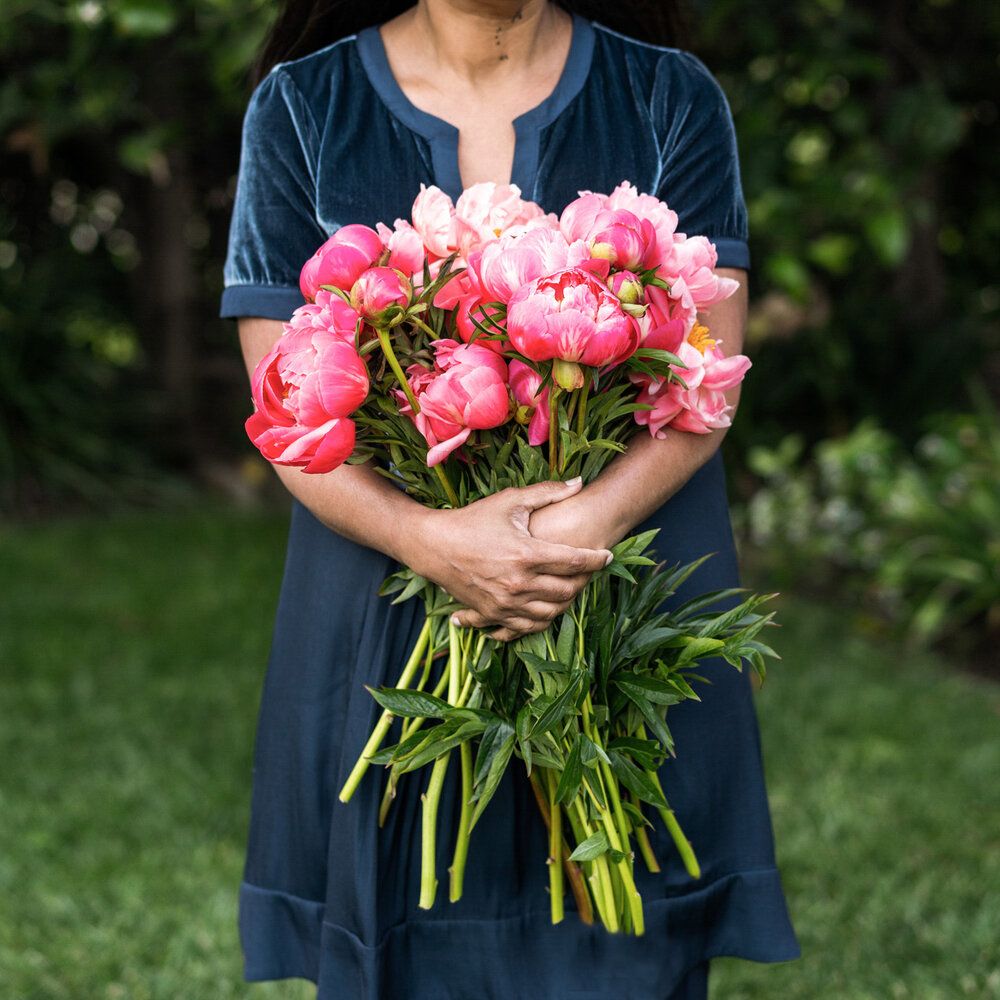
© Rohina Hoffman, Always Buy Flowers
In Rohina Hoffman’s captivating book ‘Embrace’, we witness the beauty of human interactions through intimate photographs that stir emotions and touch our hearts. As we delve into her work and juxtapose it with the impact of the COVID-19 pandemic, we find ourselves yearning for connection even when physical presence seems impossible. One aspect that particularly stands out is the shared act of preparing and eating meals together, which has taken on new significance in a world marked by distance and longing.
With the world slowing down and isolating us at home, the pandemic provided us with a rare opportunity to reflect on our lives, habits, pasts, and futures as artists. Rohina Hoffman, an American artist of Indian descent, utilized that time to reflect more deeply on her childhood in India and to think about the advantages of having family in the United States. Embrace skillfully combines various worlds in a memoir that is an in-depth examination of the self and family. I have recently found myself reflecting on the past three years, and my own rituals and values which were transformed along the way. Through the customs of everyday meals, Hoffman takes us on a metaphorical journey connecting her roots to food.
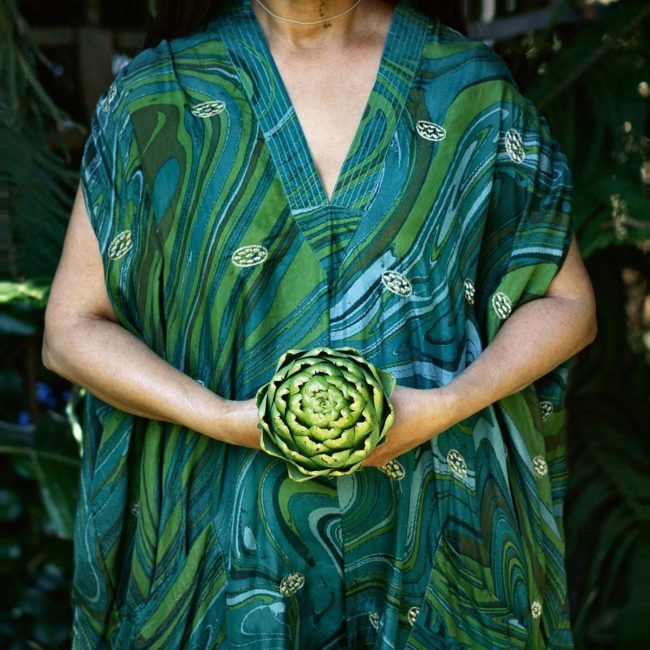
© Rohina Hoffman, Artichoke for steaming with aromatics
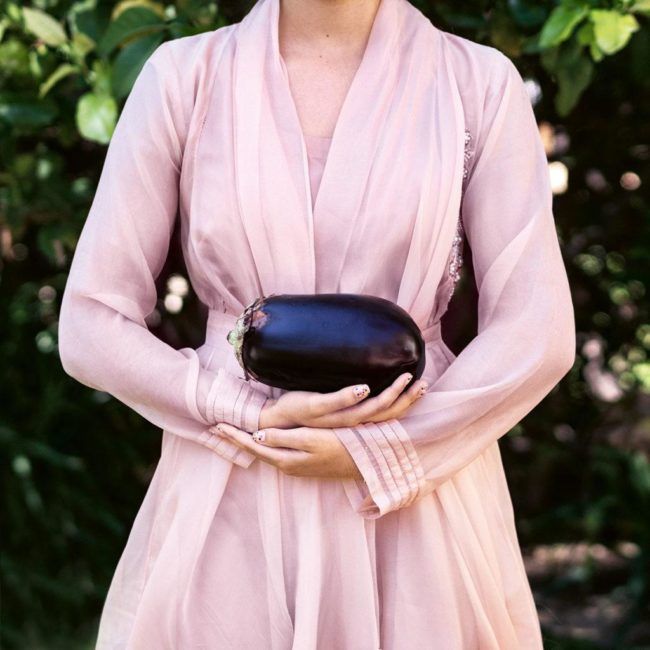
© Rohina Hoffman, Eggplant for Baingan Bharta
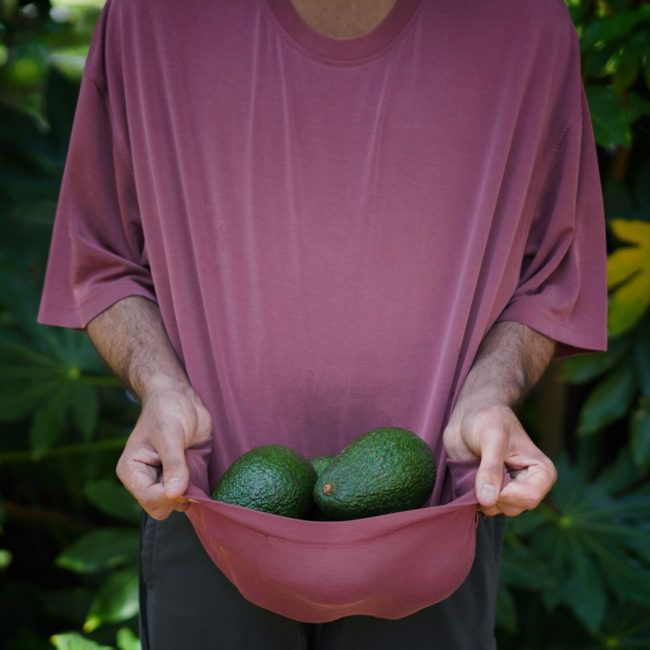
© Rohina Hoffman, Avocados for avocado toast
Hoffman connects two photography projects in Embrace: In Gratitude and Generation 1.75. Food and family are honored in the project In Gratitude. It is a collection of images of Hoffman, her husband, and her three children that were taken in the early stages of the pandemic and highlight the fresh ingredients they use to prepare their daily meals. Hoffman’s poetry is peppered amongst the images on pearlescent interleaved pages of prose. As it was for many people during the height of the pandemic, and in times of enormous uncertainty, the act of taking pictures and making food evolved into a habit that is almost meditative.
The middle section of Embrace is printed on a blue background. This section contains Hoffman’s written observations that detail the various stops on her life’s journey. Her essay, ‘Not All Peacocks are Blue’ has also been reproduced in English and Hindi, and also written in a beautiful script called Devanagar.
Generation 1.75 examines issues of identity, belonging, and the difficulties of acculturation. Hoffman was born in 1968 and raised by her grandparents. When she was five years old, she was reunited with her parents and started a new life in America.
“I often feel of two worlds, sometimes not quite settled, not fully rooted. I am part of Generation 1.5/1.75, a termed coined by Professor Ruben Rumbaut in 1969 to distinguish those who immigrate as children from their parents who immigrate as adults. As immigrant children, there is a discontinuity with our origins due to inherited circumstance beyond our control. This exploration of self, often using the narrative of the natural world, helps me understand the precarious balance of integration and alienation, neither here nor there and then sometimes also both here and there. I am sometimes the alienated insider, sometimes the Other, and at times, fully and easily assimilated. Growing up multicultural can be conflicting and is a constant balancing act, a gift and a burden all at the same time.” Rohina Hoffman

© Rohina Hoffman, Moon Child

© Rohina Hoffman, Chaand

© Rohina Hoffman, Haidi (tumeric) in hand

© Rohina Hoffman, Cancelled
Hoffman eloquently captures food items like broccoli, artichoke, and even the fleeting freshness of avocados cradled in an outstretched t-shirt. The food is artfully paired with the colors and patterns of clothing worn by Hoffman and her family. These isolated moments evoke a sense of togetherness when viewed together – like the collective realization at the end of the story Stone Soup. It slowly dawned on everyone who brought a single item that they had created a meal to be shared and enjoyed by all, and that sharing and caring for those around you is a normal aspect of life. This feeling is profoundly precious, especially considering when the pandemic forced many to redefine how we connect with one another.
The items photographed for Generation 1.75 are also generally isolated, but still carry significant symbolic and environmental significance. Items such as a passport with pages marked ‘cancelled’, a tea set, or a slice of pizza jammed into a tiffen – is a metaphorical and lyrical look at themes of loss, instability, and gained perspective in Hoffman’s personal journey of migration, identity, and the emotions that accompany her lifelong exploration.
The pandemic has revealed our innate desire to connect, even in times of separation. Despite the physical distances, people found creative ways to still share the experience of preparing and enjoying meals together. Virtual cooking sessions became a trend, with friends and family cooking the same recipes simultaneously while connected through screens. Many individuals turned to cooking as a form of solace and self-expression. The act of preparing a meal can be therapeutic, a way to channel our emotions and find a sense of control in a chaotic world. Through cooking, we connect with our roots, revisiting family recipes and cultural dishes that brought comfort and nostalgia. Hoffman presents her viewpoint of her time during the pandemic – and poignantly reminds us of a way to reconnect to our collective embrace; the tangible presence of loved ones.
We have yearned for a return to normalcy; and for many people in the US it feels like the pandemic was much farther in the past that ‘only’ 3 years. We must cherish the lessons learned during that period of separation. The longing for connection has taught us the value of shared rituals, like preparing and eating meals together, in creating and sustaining relationships. These simple acts bind us to one another, transcending physical distances and providing solace in times of uncertainty.
::
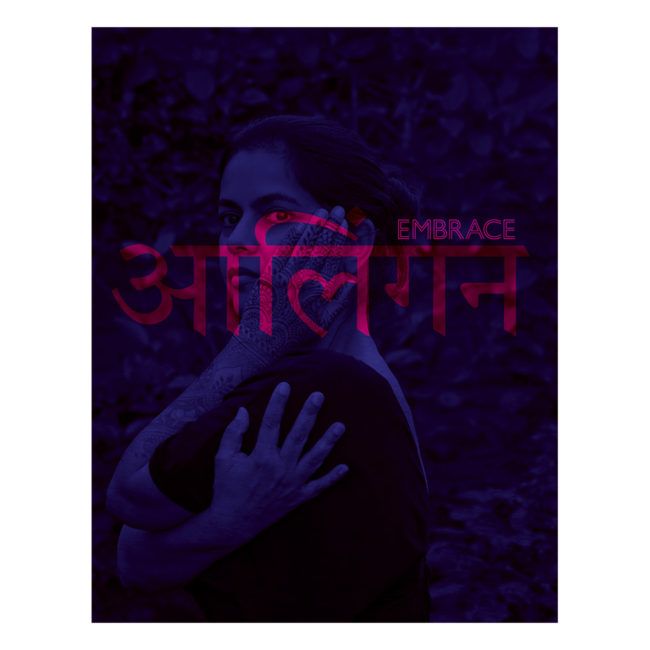
Embrace by Rohina Hoffman
Design: Caleb Cain Marcus
Essays by Paula Tognarelli and Geeta Kothari
Format: 19,9 x 25,4 cm. portrait
144 pp with approx. 50 photographs
Published by Schilt Publishing
::
Rohina Hoffman is an Indian-born American artist whose narrative work focuses on themes of identity, home, adolescence, and the female experience. Raised in New Jersey but now residing in California, Rohina received her BS in Neuroscience and MD both from Brown University. She also studied photography at the Rhode Island School of Design. Rohina published her first monograph Hair Stories with Damiani Editore (February 2019) accompanied by a solo exhibition at Brown University’s Alpert Medical School. Hair Stories is held in many public collections and university libraries. Her photographs have been exhibited widely in juried shows and in 2021 she was the winner of the Purchase Award with Atlanta Photography Group and several of her prints were acquired by the High Museum of Art in Atlanta, Georgia. https://rohinahoffman.com/
Essays are provided by Paula Tognarelli, the former Executive Director of the Griffin Museum of Photography, and Geeta Kothari, a senior editor of the Kenyon Review.
::
A review of Rohina Hoffman’s Hair Stories was featured in F-Stop Magazine in July of 2019.
Location: Online Type: Book Review, Family, Food, Portraits
Events by Location
Post Categories
Tags
- Abstract
- Alternative process
- Architecture
- Artist Talk
- artistic residency
- Biennial
- Black and White
- Book Fair
- Car culture
- Charity
- Childhood
- Children
- Cities
- Collaboration
- Community
- Cyanotype
- Documentary
- Environment
- Event
- Exhibition
- Faith
- Family
- Fashion
- Festival
- Film Review
- Food
- Friendship
- FStop20th
- Gender
- Gun Culture
- Habitat
- Hom
- home
- journal
- Landscapes
- Lecture
- Love
- Masculinity
- Mental Health
- Migration
- Museums
- Music
- Nature
- Night
- nuclear
- p
- photographic residency
- Photomontage
- Plants
- Podcast
- Portraits
- Prairies
- Religion
- River
- Still Life
- Street Photography
- Tourism
- UFO
- Water
- Zine

Leave a Reply